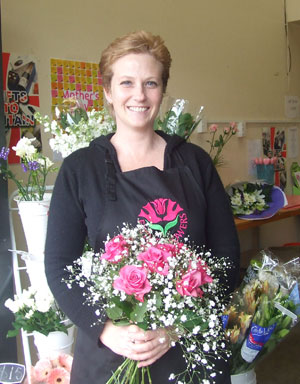Florist
Tasks & duties

Florists may do some or all of the following:
-
treat flowers to extend their life
-
design and put together flowers in bouquets, posies and arrangements
-
design and advise about flowers for functions and special occasions
-
help people choose flowers or plants
-
take and make up orders for flowers
-
write messages on cards
-
deliver or arrange delivery of flower designs
-
look after flowers and indoor plants
-
buy wrap, plants, vases and baskets from sales representatives
-
keep shop displays neat and tidy
-
keep records and accounts
-
sweep and clean the shop of plant debris
-
attend markets and auctions and bid for flowers
Skills & knowledge
Florists need to have:
-
knowledge of flowers and plants
-
the ability to care for and arrange cut flowers
-
up-to-date knowledge of trends in floristry
-
knowledge of Interflora and Teleflora ordering procedures
-
an understanding of business management, basic maths and accounting
-
sales skills
-
excellent communication and people skills
-
planning and organisation skills
-
good literacy skills
-
knowledge of basic first aid and occupational health and safety procedures
Entry requirements
There are no specific entry requirements to become a florist. However, sitting exams through New Zealand Professional Florists is a good way of entering the job and building up a professional name in the floristry community.
New Zealand Professional Florists website
Florists wanting to become members of Interflora or Teleflora must also pass examinations to gain membership.
You can also train on the job and complete an apprenticeship through the New Zealand Horticulture Industry Training Organisation (NZHITO). This is only available through approved employers.
A driver's licence is useful for deliveries.
Secondary education
Three years of secondary school education is needed to enter many floristry courses. English, design and art are useful subjects.
Tertiary education
A tertiary qualification in commercial floristry is useful. Pre-employment courses in floristry, in which students can begin working towards their New Zealand Professional Florists qualifications, are also available.
Training on the job
Most training is done on the job. Florists can keep updating their skills and knowledge by sitting exams through New Zealand Professional Florists, attending courses, garden shows and seminars, and networking with other florists.
Useful experience
Useful experience for florists includes:
-
work experience in florist shops
-
work that involves customer service or handling money
-
experience working with colour, design and form
-
window-dressing work
-
work in plant nurseries
Video
From just a job on you tube
Related courses
Floristry
Sales
For more information, please refer to Career Services.
Document Actions
